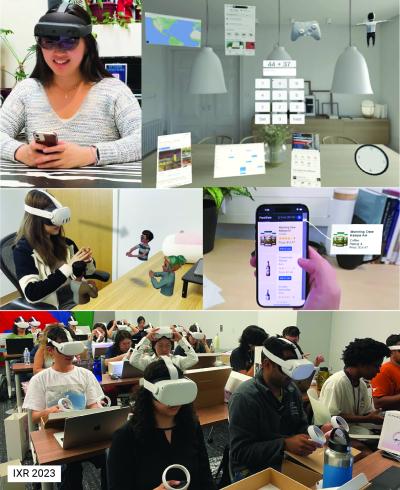Related People
Nikolas Martelaro, Ken Holstein, Sherry Tongshuang Wu, John Zimmerman, Erik Harpstead, Sarah Fox, David Lindlbauer
Up Next in Special Topics
Our Special Topics courses provide the opportunity to explore the future of human-computer interaction, guided by the experts who are shaping the field of HCI.
These dynamic courses enhance the standard curriculum to give students the opportunity to keep up with the latest trends, build with emerging technologies and explore timely research questions. Students can take advantage of our Special Topics to expand their HCI skillsets beyond the core courses and specialize in areas that ignite their curiosity.
It is important to note that all Special Topics courses offered by the Human-Computer Interaction Institute share the same course number: 05-499/05-899. Although the number stays the same, the individual course offerings change each semester based on available faculty and their expertise. This just means that Section A this semester will likely be a different course next semester, so be sure to check back each semester for new opportunities.
Explore the current list of Special Topics courses below. Additional information about each section is available on its course page.
Fall 2025 HCII Special Topics Courses
Section A: The Augmented AI Designer with Nik Martelaro
This course will explore how designers can augment and accelerate their work with the use of AI. Students will design and develop multiple prototypes on their own, and then they will then critically reflect on their process and their use of tools to develop an understanding of when and where AI can best support their work.
Section B: Augmenting Intelligence with Ken Holstein
This course explores the design and evaluation of technologies that aim to augment and amplify human cognitive capabilities. Students will examine historical visions of “augmented intelligence” across various fields, including human-computer interaction, artificial intelligence, cognitive science, collective intelligence, and computer-supported cooperative work.
Section D: Human-Centered NLP with Sherry Wu
"HCI people design useful things that NLP people cannot build; NLP people make things that nobody uses.” (Yang et al., 2019) This course aims to help students develop the mindsets and skills necessary to build useful natural language processing (NLP) systems, by exploring the intersection between HCI and NLP.
Section E: AI Innovation in the Healthcare Sector with John Zimmerman
This course explores why most AI innovations targeting the healthcare sector have failed to be impactful. It will equip students to envision new AI healthcare innovations that avoid the most common breakdowns: requires unachievable model performance, does not address real healthcare challenges (no adoption), costs more than it can generate in revenue, violates current healthcare policies, not trusted or acceptable by clinicians, or introduces an AI ethical risk.
Section F: Learning Analytics and Educational Data Science with Erik Harpstead
This course provides students with a foundational understanding of the principles, methods, and tools used in learning analytics. Students will explore how data can be collected, analyzed, and interpreted to gain insights into student learning behaviors, improve learning outcomes, and inform instructional practices.
Section G: Designing for Present and Future of Work with Sarah Fox
This course explores how emerging technologies, organizational structures, and worker experiences shape contemporary labor. Drawing from design, labor studies, and critical management studies, this course examines the challenges and opportunities of designing for equitable and sustainable workplaces.
Section H: Interactive Extended Reality with David Lindlbauer
This course focuses on the foundations and challenges of building interactive Extended Reality (XR) systems. The class will provide students with hands-on experience in designing and building XR systems that could be employed in a variety of domains, from everyday XR to productivity, manufacturing, and health care.
For a full list of course offerings, visit the HCI Courses page.
Research Areas


